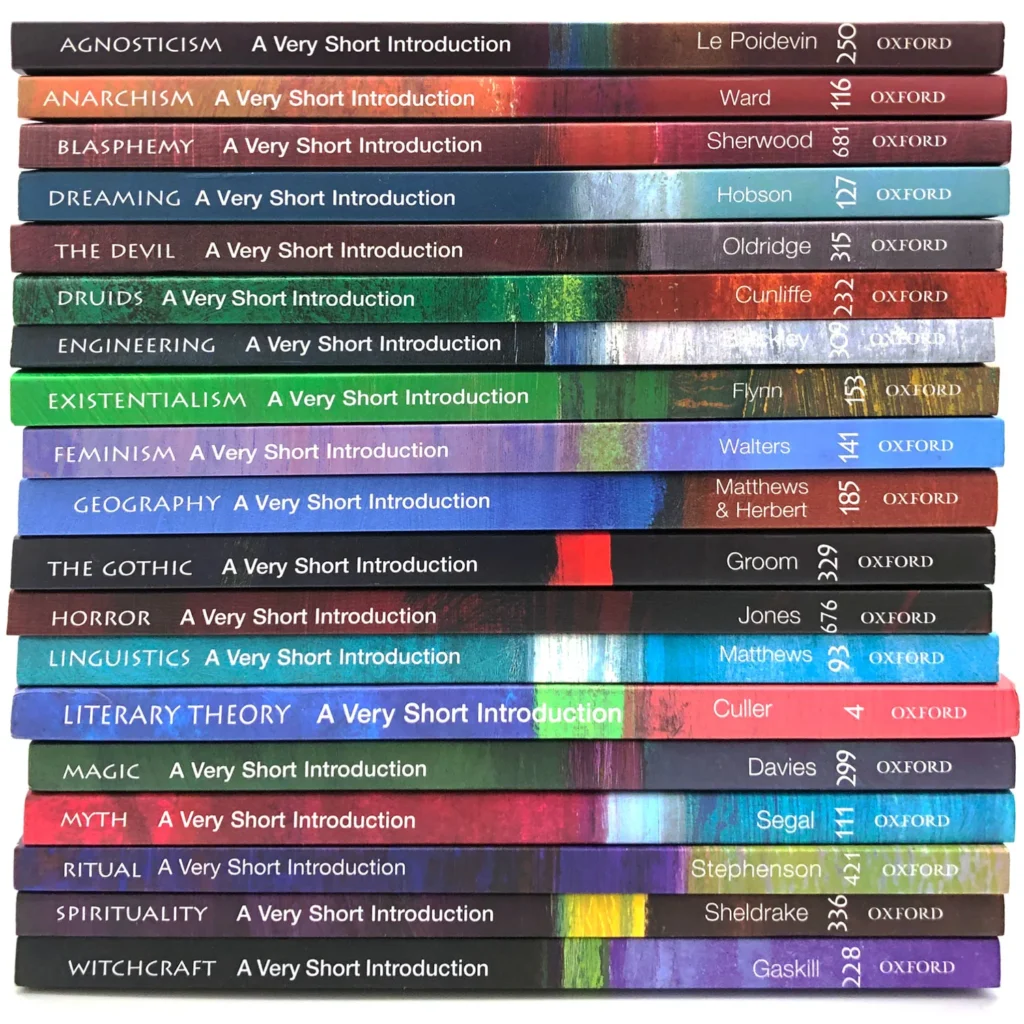If you’re anything like me, you love learning about reality and uncovering how it all works. The world is filled with profound complexities, and diving into its mysteries can be both humbling and exhilarating. If you’re seeking a way to explore new topics in a concise and approachable manner, the “A Very Short Introduction” series is the perfect gateway.
This acclaimed series comprises hundreds of expertly crafted, concise books on a wide array of topics. Each volume serves as a brief, yet highly informative introduction to its subject, offering a snapshot of its essence. Whether you’re looking to dip your toes into something unfamiliar or gauge your interest in a topic before delving deeper, these books provide an excellent starting point.
One of the most mind-boggling aspects of life is just how intricate, interconnected, and magical it all is. To cultivate a deeper appreciation for this infinite complexity, I’ve decided to read one book from this series every month alongside my other reading. It’s a simple yet powerful way to broaden my perspective and expand my understanding of the world.

The “A Very Short Introduction” series currently boasts over 730 titles, with page lengths ranging between 100 and 200 pages. These books are succinct enough to finish quickly but rich enough to leave you pondering long after you’ve closed the last page.
Here are just a few of the fascinating titles to spark your curiosity:
Science and Technology
Algorithms (by David Harel)
Artificial Intelligence (by Margaret A. Boden)
Astrobiology (by David C. Catling)
Astronomy (by James Binney)
Astrophysics (by James Binney)
Bacteria (by Sebastian G. B. Amyes)
Biodiversity (by David Macdonald and Katherine Willis)
Biochemistry (by Mark Lorch)
Bioethics (by Helga Kuhse)
Climate Change (by Mark Maslin)
Cognitive Neuroscience (by Richard Passingham)
Complexity (by John H. Holland)
Cosmology (by Peter Coles)
Cryptography (by Fred Piper and Sean Murphy)
Data Science (by David Hand)
Energy (by Vaclav Smil)
Engineering (by David Blockley)
Evolution (by Brian Charlesworth and Deborah Charlesworth)
Forensic Science (by Jim Fraser)
Galaxies (by John Gribbin)
Game Theory (by Ken Binmore)
Genetics (by John Archibald)
Gravity (by Timothy Clifton)
Holography (by Michael Katzmann)
Information (by Luciano Floridi)
Lasers (by Wilson Sibbett)
Magnetism (by Stephen J. Blundell)
Nanotechnology (by Philip Moriarty)
Nuclear Physics (by Frank Close)
Particle Physics (by Frank Close)
Quantum Theory (by John Polkinghorne)
Relativity (by Russell Stannard)
Robotics (by Alan Winfield)
Scientific Method (by Samir Okasha)
The Immune System (by Paul Klenerman)
The Laws of Thermodynamics (by Peter Atkins)
The Periodic Table (by Eric Scerri)
The Sun (by Philip Judge)
The Universe (by Peter Coles)
Waves (by Mike Goldsmith)
Zoology (by Tristram D. Wyatt)
History
The American Civil War (by James M. McPherson)
The Aztecs (by David Carrasco)
The British Empire (by Ashley Jackson)
The Cold War (by Robert J. McMahon)
The Crusades (by Christopher Tyerman)
The Enlightenment (by John Robertson)
The French Revolution (by William Doyle)
The Habsburg Empire (by Martyn Rady)
The History of Mathematics (by Jacqueline Stedall)
The History of Physics (by J. L. Heilbron)
The History of Time (by Leofranc Holford-Strevens)
The Incas (by Kevin Lane)
The Industrial Revolution (by Robert C. Allen)
The Mongols (by Morris Rossabi)
The Ottoman Empire (by Suraiya Faroqhi)
The Reformation (by Peter Marshall)
The Renaissance (by Jerry Brotton)
The Roman Empire (by Christopher Kelly)
The Russian Revolution (by S. A. Smith)
Philosophy
Aristotle (by Jonathan Barnes)
Critical Thinking (by Richard Paul and Linda Elder)
Ethics (by Simon Blackburn)
Existentialism (by Thomas Flynn)
Hume (by A. J. Ayer)
Kant (by Roger Scruton)
Logic (by Graham Priest)
Marx (by Peter Singer)
Metaphysics (by Stephen Mumford)
Nietzsche (by Michael Tanner)
Phenomenology (by Dan Zahavi)
Philosophy of Mind (by Barbara Gail Montero)
Philosophy of Religion (by Jack Copeland)
Philosophy of Science (by Samir Okasha)
Plato (by Julia Annas)
Political Philosophy (by David Miller)
Rousseau (by Robert Wokler)
The Enlightenment Philosophy (by John Robertson)
Utilitarianism (by Katarzyna de Lazari-Radek and Peter Singer)
Wittgenstein (by A. C. Grayling)
Religion and Spirituality
Apocalypse (by Christopher Rowland)
Atheism (by Julian Baggini)
Buddhism (by Damien Keown)
Catholicism (by Gerald O’Collins)
Christian Ethics (by D. Stephen Long)
Christianity (by Linda Woodhead)
Confucianism (by Daniel K. Gardner)
Hinduism (by Kim Knott)
Islam (by Malise Ruthven)
Islamic History (by Adam Silverstein)
Judaism (by Norman Solomon)
Mysticism (by F. C. Happold)
Paganism (by Owen Davies)
Saints (by Simon Yarrow)
Sikhism (by Eleanor Nesbitt)
The Bible (by John Riches)
The Dead Sea Scrolls (by Timothy Lim)
The Koran (by Michael Cook)
Theology (by David F. Ford)
Zoroastrianism (by Jenny Rose)
Social Sciences
Anthropology (by John Monaghan and Peter Just)
Capitalism (by James Fulcher)
Corruption (by Leslie Holmes)
Crime (by Tim Newburn)
Democracy (by Bernard Crick)
Econometrics (by James H. Stock)
Economics (by Partha Dasgupta)
Fascism (by Kevin Passmore)
Free Will (by Thomas Pink)
Gender (by R. W. Connell)
Global Economic History (by Robert C. Allen)
Globalisation (by Manfred B. Steger)
Human Rights (by Andrew Clapham)
Liberty (by Quentin Skinner)
Migration (by Khalid Koser)
Nationalism (by Steven Grosby)
Population (by Sarah Harper)
Poverty (by Philip Alston)
Psychology (by Gillian Butler and Freda McManus)
Public Administration (by Martin Loughlin)
Race (by Ali Rattansi)
Social Work (by Sally Holland and Jonathan Scourfield)
Socialism (by Michael Newman)
Sociology (by Steve Bruce)
The European Union (by John Pinder and Simon Usherwood)
The Welfare State (by David Garland)
Terrorism (by Charles Townshend)
War and Technology (by Alex Roland)
Arts and Culture
Architecture (by Andrew Ballantyne)
Art History (by Dana Arnold)
Classical Literature (by William Allan)
Comics and Graphic Novels (by Dominic Davies)
Contemporary Art (by Julian Stallabrass)
Dance (by Malcom Poole)
Design (by John Heskett)
Drama (by Tiffany Stern)
Film (by Michael Wood)
Landscape Architecture (by Ian Thompson)
Modern Art (by David Cottington)
Modernism (by Christopher Butler)
Music (by Nicholas Cook)
Opera (by Michael Tanner)
Photography (by Steve Edwards)
Poetry (by Bernard O’Donoghue)
The Blues (by Elijah Wald)
The Gothic (by Nick Groom)
The Orchestra (by D. Kern Holoman)
Theatre (by Marvin Carlson)
Video Games (by Tom Chatfield)
Medicine and Health
Addiction (by Keith Humphreys)
Autism (by Uta Frith)
Cancer (by Nicholas James)
Cancer Biology (by Jane Goodall)
Dementia (by Kathleen Taylor)
Epidemiology (by Rodolfo Saracci)
Heart Disease (by David Warriner)
HIV/AIDS (by Alan Whiteside)
Mental Health (by David M. Clark and Aaron T. Beck)
Neuroscience (by Michael O’Shea)
Pain (by Rob Boddice)
Pandemics (by Christian W. McMillen)
Public Health (by Virginia Berridge)
Reproductive Biology (by Martin H. Johnson)
Sleep (by Steven W. Lockley and Russell G. Foster)
Blood (by Chris Cooper)
The Brain (by Michael O’Shea)
The Genetics of Cancer (by Angela Baker)
The Human Body (by Leslie Klenerman)
Vaccines (by Kristen A. Feemster)
Science and Nature
Birds (by David Lindo)
Coral Reefs (by Charles Sheppard)
Dinosaurs (by David Norman)
Earthquakes (by Kelin Wang)
Ecology (by Jaboury Ghazoul)
Forests (by Jaboury Ghazoul)
Glaciers (by Peter G. Knight)
Insects (by Simon Leather)
Marine Biology (by Philip V. Mladenov)
Mathematics (by Timothy Gowers)
Microbiology (by Nicholas P. Money)
Mushrooms (by Nicholas P. Money)
Rivers (by Nick Middleton)
Trees (by Peter Thomas)
Volcanoes (by Michael J. Branney and Jan Zalasiewicz)
Water (by John Finney)
Weather (by Storm Dunlop)
Worms (by Caspar Henderson)
Never underestimate the value of exploring topics that might initially seem unimportant. Delving into unique aspects of reality and understanding how they interconnect can profoundly expand your perspective. This kind of exploration deepens your existential appreciation for life while unveiling the vast potential and complexity of the world. By engaging with these ideas, you gain a broader understanding of how different perspectives shape reality, opening the door to new ways of thinking and being.
In studying these topics, you also uncover the limitations of various human philosophies and perspectives, revealing both their strengths and blind spots. By immersing yourself in this learning, you foster a greater sense of wonder and connection, gaining insights into the human condition, nature, technology, history, politics and science and embracing the endless opportunities for growth and discovery. Who knows, you may even stumble into a field that you decide to pursue over your entire lifetime. You need exposure to a wide variety of ideas to find what you are most interested in.
The main goal here is to expand your curious nature and feed your hunger for lifelong learning.
Happy reading!
#22



